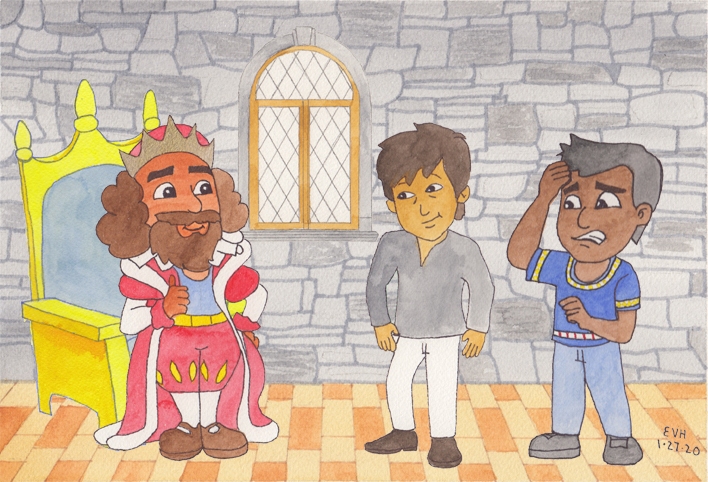
Jataka 211
Somadatta Jātaka
The Story of Somadatta
as told by Eric Van Horn
originally translated by William Henry Denham Rouse, Cambridge University
originally edited by Professor Edward Byles Cowell, Cambridge University
This is a sweet story about a man who is terminally shy. The real hero is the King who is very understanding, kind, and compassionate to the poor man.
“All the year long, never ceasing.” The Master told this story while he was at Jetavana. It is about the Elder Lāḷudāyī, or “Udāyī the Simpleton.”
This man, we learn, was unable to get out a single sound in the presence of two or three people. He was so nervous that he said one thing when he meant another. It happened that the monks were discussing this as they sat together in the Dharma Hall. The Master came in and asked what they were talking about as they sat there together. When they told him, he responded, “Monks, this is not the first time that Lāḷudāyī has been a very nervous man. It was just the same before.” And he told this story from the past.
Once on a time, when Brahmadatta was the King of Benares, the Bodhisatta was born into a brahmin family in the kingdom of Kāsi. When he came of age, he went to study at Takkasilā University. When he returned he found that his family was poor. He said good-bye to his parents and set out to Benares, saying to himself, “I will set up my fallen family again!”
At Benares he became the King’s attendant, and he grew to be very dear to the King and became a favorite of his.
Now his father lived by ploughing the land. But he had only one pair of oxen, and one of them died. He went to the Bodhisatta and said to him, “Son, one of my oxen is dead, and the ploughing cannot continue. Ask the King to give you an ox!”
“No, father,” he replied, “I just saw the King. I should not ask him for oxen now. You ask him yourself.”
“My son,” his father said, “you do not know how bashful I am. If there are two or three people present I cannot get a word out. If I go to ask the King for an ox, I shall end by giving him this one!”
“Father,” said the Bodhisatta, “what must be, must be. I cannot ask the King. But I will train you to do it.” So he led his father to a cemetery where there were clumps of sweet grass. And tying up tufts of it, he scattered them here and there. He named them one by one, pointing them out to his father: “That is the King, that is the Viceroy, this is the Chief Captain. Now, Father, when you come before the King, you must first say, ‘Long live the King!’ Then repeat this verse, to ask for an ox." And this is the verse he taught him:
“I had two oxen to my plough, with which my work was done,
But one is dead! Oh mighty prince, please give me another one!”
For a whole year the man learned this couplet, and finally he said to his son, “Dear Somadatta, I have learned the lines! Now I can say it before anyone! Take me to the King.”
So the Bodhisatta, taking a suitable present, led his father into the King’s presence. “Long live the King!” cried the brahmin, offering his present.
“Who is this brahmin, Somadatta?” the King asked.
“Great King, it is my father,” he answered.
“Why has he come here?” asked the King. Then the brahmin repeated his couplet to ask for the ox:
“I had two oxen to my plough, with which my work was done,
But one is dead! Oh mighty prince, please take the other one!”
The King saw that there was some mistake. “Somadatta,” he said, smiling, “you have plenty of oxen at home, I suppose?”
“If so, great King, they are your gift!”
The King was pleased with this answer. He gave the man, for a brahmin’s offering, 16 oxen with fine ornaments and a village to live in. Then he sent him away with great honor. The brahmin got into a chariot drawn by pure white Sindh horses and went to his home in great splendor.
As the Bodhisatta sat beside his father in the chariot, he said, “Father, I taught you the couplet the whole year long, and yet when the moment came you gave your ox to the King!” and he uttered the first stanza:
“All the year long never ceasing with unwearied diligence
Where the sweet grass grows in clusters day by day he practiced it.
When he came amid the courtiers all at once he changed the sense,
Practice truly nothing helps if a man has little wit.”

Figure: “I taught you the couplet the whole year long!”
When he heard this, the brahmin uttered the second stanza:
“He that asks, dear Somadatta, takes his chance between the two,
He may get more, or may get less, when he asks. ’Tis ever so.”
When the Master had shown in this story how Simpleton Udāyī had been just as bashful before as he was then, he identified the birth, “Lāḷudāyī was the father of Somadatta, and I was Somadatta.”
